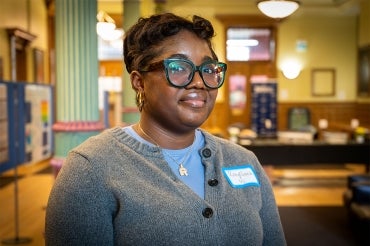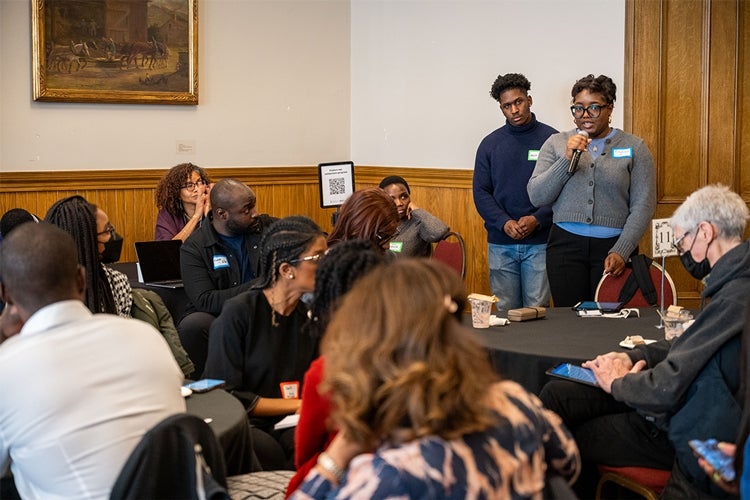U of T undergrad helps develop database on Black health research

U of T Mississauga undergrad Rayshaun Whyte was one of several presenters who shared their research projects at the BRN Research Symposium (photo by Andy Jibb)
Published: May 22, 2025
For Rayshaun Whyte, learning about challenges faced by Black Canadians in the health-care system wasn’t enough – she wanted to take action.
Whyte, a fifth-year undergraduate student at the University of Toronto Mississauga, is part of an interdisciplinary team of student researchers, faculty and librarians that is developing the Black Canadian Health Research Database – a resource designed to improve access to information on health-care outcomes, race and policy development.
“I wanted to be part of something that didn’t just talk about these issues but actively worked to address the realities for Black people in the health-care system,” says Whyte, who is majoring in psychology and anthropology with a minor in biology.
Expected to launch next year, the database will feature more than 200 academic and community-oriented materials, including journal articles, podcasts, infographics, newsletters and policy documents. It aims to fill a long-standing research gap on Black health in Canada, while remaining accessible to scholars, community members and advocacy groups.
Whyte recently presented key insights from the project during the poster sessions at a research symposium hosted by the Black Research Network, one of several U of T institutional strategic initiatives. The project is supported by the Black Research Network’s IGNITE Grant, awarded to Prentiss Dantzler, an associate professor of sociology in U of T’s Faculty of Arts & Science.

Led by UTM Library’s David Gerstle, a research services and liaison librarian, and Maria Ruiz, a reference and instruction librarian, the project’s current development phase includes gathering and categorizing materials. These resources will be searchable by keyword and topic. The database is also being designed to accommodate diverse language needs, accessibility requirements and learning styles – one of the key reasons for including materials in a variety of formats.
Student researchers from disciplines such as psychology, anthropology, geography, sustainability and medicine are contributing to the project. Whyte says this interdisciplinary approach opens broader conversations about health-care access and the social determinants of health.
“Race was the starting point, but health care and your experiences with its systems are also shaped by gender, sexuality and class,” Whyte says. “We wanted to reflect that intersectionality.
“We want this to be a community effort, and that doesn’t just mean academics or advocacy groups but for anyone who identifies as Black, Caribbean, Afro-Caribbean and Black Canadian.”



